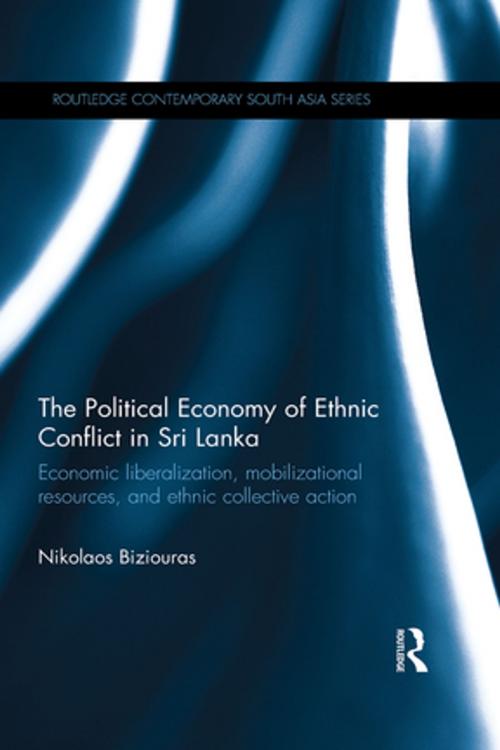The Political Economy of Ethnic Conflict in Sri Lanka
Economic Liberalization, Mobilizational Resources, and Ethnic Collective Action
Nonfiction, Social & Cultural Studies, Social Science, Cultural Studies, Ethnic Studies, Political Science| Author: | Nikolaos Biziouras | ISBN: | 9781317805526 |
| Publisher: | Taylor and Francis | Publication: | March 26, 2014 |
| Imprint: | Routledge | Language: | English |
| Author: | Nikolaos Biziouras |
| ISBN: | 9781317805526 |
| Publisher: | Taylor and Francis |
| Publication: | March 26, 2014 |
| Imprint: | Routledge |
| Language: | English |
At the point of independence in 1948, Sri Lanka was projected to be a success story in the developing world. However, in July 1983 a violent ethnic conflict which pitted the Sinhalese against the Tamils began, and did not come to an end until 2009. This conflict led to nearly 50,000 combatant deaths and approximately 40,000 civilian deaths, as well as almost 1 million internally-displaced refugees and to the permanent migration abroad of nearly 130,000 civilians.
With a focus on Sri Lanka, this book explores the political economy of ethnic conflict, and examines how rival political leaders are able to convince their ethnic group members to follow them into violent conflict. Specifically, it looks at how political leaders can influence and utilize changes in the level of economic liberalization in order to mobilize members of a certain ethnic group, and in the case of Sri Lanka, shows how ethnic mobilization drives can turn violent when minority ethnic groups are economically marginalized by the decisions that the majority ethnic group leaders make in order to stay in power.
Taking a political economy approach to the conflict in Sri Lanka, this book is unique in its historical analysis and provides a longitudinal view of the evolution of both Tamil and Sinhalese ethnic drives. As such, this interdisciplinary study will be of interest to policy makers as well as academics in the field of South Asian studies, political science, sociology, development studies, political economy and security studies.
At the point of independence in 1948, Sri Lanka was projected to be a success story in the developing world. However, in July 1983 a violent ethnic conflict which pitted the Sinhalese against the Tamils began, and did not come to an end until 2009. This conflict led to nearly 50,000 combatant deaths and approximately 40,000 civilian deaths, as well as almost 1 million internally-displaced refugees and to the permanent migration abroad of nearly 130,000 civilians.
With a focus on Sri Lanka, this book explores the political economy of ethnic conflict, and examines how rival political leaders are able to convince their ethnic group members to follow them into violent conflict. Specifically, it looks at how political leaders can influence and utilize changes in the level of economic liberalization in order to mobilize members of a certain ethnic group, and in the case of Sri Lanka, shows how ethnic mobilization drives can turn violent when minority ethnic groups are economically marginalized by the decisions that the majority ethnic group leaders make in order to stay in power.
Taking a political economy approach to the conflict in Sri Lanka, this book is unique in its historical analysis and provides a longitudinal view of the evolution of both Tamil and Sinhalese ethnic drives. As such, this interdisciplinary study will be of interest to policy makers as well as academics in the field of South Asian studies, political science, sociology, development studies, political economy and security studies.















